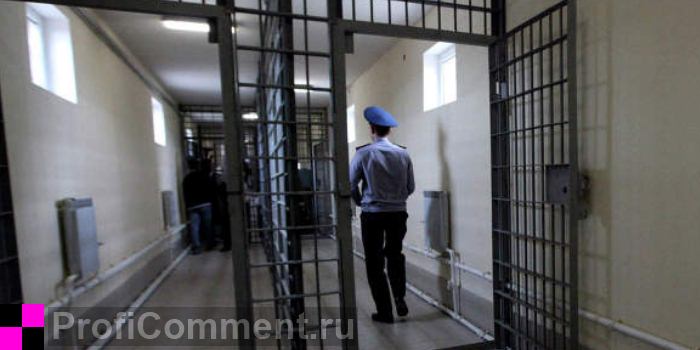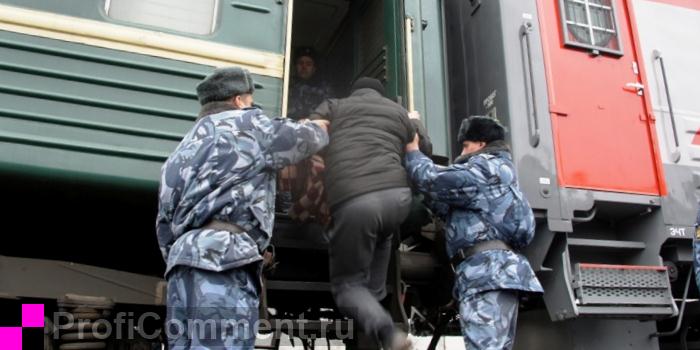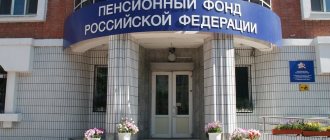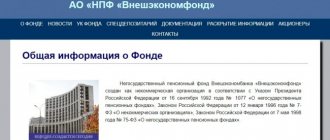- Specialists of the Pension Fund of the Russian Federation answer this question as follows: When a pensioner moves to another city within the Russian Federation, his pension file can be sent to the territorial body of the Pension Fund of the Russian Federation at his new place of residence. To do this, you will need to contact the territorial office of the Pension Fund of the Russian Federation at your new place of residence and write an application so that a request can be made to forward the pension file to this office. Along with the application, you must submit documents proving your identity and registration at your new place of residence. For citizens of the Russian Federation, pensions can be paid at the place of their actual residence, and in this case, the pensioner’s application is accepted in confirmation of the residence address. Then you can choose the pension delivery method that is most convenient.
How to arrange a pension payment in another locality
The application that the pensioner must write addressed to the head of the Pension Fund branch must contain the following data:
- Full name of the pensioner drawing up the application;
- Country, city, date, month, year of birth;
- Passport information, including registration information, as well as the name of the office that issued it;
- Insurance ID numbers must be indicated;
- Naturally, you will need a pensioner’s ID and all documents indicating that the citizen has received such status and a specific amount of pension payments;
- Contact information through which communication can be established with a citizen in the event of a specific need;
- The application must also indicate the name of the financial institution to which the pension is transferred. To do this, you must indicate your bank account number.
Pensions in 2020 in Russia
In 2020, a number of uncharacteristic changes will occur regarding the pension provision of citizens:
The procedure for indexing social pensions and payments made by the Pension Fund of the Russian Federation will remain the same: the former will be increased by the corresponding forecast level of price growth, presumably by 4.1%, and the latter - from February 1 to last year’s actual inflation (3.2%).
In addition, there will be a number of changes regarding the conditions for assigning an insurance pension, increasing the cost of living of a pensioner to establish a social supplement, as well as changing the amount of the insurance contribution for the self-employed population.
It should be noted that an increase in the retirement age is not expected in 2018 , despite repeated mention of the need for this measure.
The procedure for transferring a pension to a new place of residence
After the pensioner is registered in the new branch, payments will be made in accordance with the changed place of residence. To transfer material assets, the method specified by the pensioner during the application process will be used after submitting it to the territorial branch of the Pension Fund. You need to understand that the transfer of any pension file and, accordingly, the transfer of pension payments is considered the right of all categories of citizens. For this reason, the authorized body must carry out all the above actions only on the basis of an application received from the pensioner. Useful information For a pensioner, completing all the necessary documentation is not so simple. When moving to a new place of residence, before changing the place of receiving pension payments, it is recommended that the citizen register with the institutions of the Ministry of Internal Affairs.
What pensions are entitled to FSIN employees?
The article has already mentioned that pensions for this category of citizens are regulated by law number 4468-1, which also states that employees can receive monthly allowances for disability and long service.
It is possible to obtain a pension in the event of the untimely loss of a breadwinner, if a law enforcement officer dies. In this case, the payment is due to his family.
The state also provides that a citizen can receive a second pension if, after serving in the FSIN, he decides to continue working, but in a different field. In this case, he needs to gain a minimum working experience in order to qualify for the insurance pension, which is due to the majority of able-bodied Russians. This rule works for all categories. Military personnel can receive two pensions under the same scheme.
Payment of pension upon change of residence
- At least a month before this event, you need to send a notification to the local Pension Fund. Certain documents must be attached:
- Every year a document is submitted to the consulate, which confirms that the pensioner is alive.
If payments are scheduled from 2020, then the funds are transferred to a card issued by a Russian bank or through an authorized person in Russia specified by the applicant. When applying for pension benefits until 2020, funds can be received at your place of residence.
Reforms 2020 will also affect the federal penitentiary service
At the same time, the funds will be distributed among 13 regions in which pensions for non-working pensioners are below the subsistence level. The list of regions includes:
- Sakhalin;
- Kamchatka;
- Chukotka;
- Komi;
- Yakutia;
- Primorsky Krai;
- Khabarovsk region;
- Arkhangelsk;
- Magadan Region;
- Murmansk region;
- Nenets Autonomous Okrug;
- Jewish Autonomous Region;
- Moscow region.
An example of a federal social supplement.
The federal cost of living (LM) for a pensioner in 2020 is 8,726 rubles. The regional cost of living, for example, in Vladimir is less, 8,452 rubles.
Important
The pensioner was assigned financial support in the amount of 7,500 rubles. Since the regional minimum wage is lower than the federal one, a federal social benefit is assigned.
8726-7500 =952 rubles. An example of a regional social supplement.
Pension department Ufsin Moscow application for moving to another city
For a new permanent residence, a person will need pension funds. In order for the Pension Fund of Russia body at the new place of residence to continue accruals to the citizen, it is necessary to complete a number of bureaucratic procedures. For such people, information is valuable on how to transfer a pension to another city in connection with a move and whether the size of the pension changes when moving to another region. Content
- 1 Is the amount of pension benefits maintained when moving?
- 2 Transfer of pension to another city (Moscow)
- 3 Pension for Russians going to live abroad
- 4 How to transfer your pension when changing your place of residence
- 5 How to receive a pension in another city
Is the amount of pension benefits the same when moving? The pension does not change when moving to another region.
- lack of a place of work;
- receiving maintenance in Moscow (without taking into account the type of security and the body paying it);
- registration at the place of residence in Moscow for 10 years or more (summing up all periods of residence is allowed).
- An additional payment up to the subsistence level in Moscow (in 2020 its amount is 11,561 rubles) is made to pensioners if a number of conditions are met:
- lack of a place of work;
- receiving content of any kind;
- availability of registration at the place of residence, if the duration of registration in the subject is less than 10 years or the absence of registration in Russia.
Northern pension when moving If they have work experience in regions with the status of the Far North, citizens have the right to increase their pension payments. For a pensioner, all types of mandatory payments and bonuses for overtime based on length of service, length of service, awards and insignia, special working conditions are retained (similar bonuses are awarded to miners, geologists, polar explorers, etc.). The amount of allowance in other regions of Russia will not change: the social and insurance parts of payments remain at the same level. Payments are not adjusted in those precedents if a person leaves those areas where the “northern coefficient” is used.
The payment to such a pensioner will be calculated based on the number of years lived in the northern area before departure. The pension period for residents of the North has lower thresholds than in other regions of Russia. If a pensioner moves to an area whose location falls under the “northern allowances”, then the monthly allowance increases in accordance with the size of the regional coefficient.
RESOLUTION of January 30, 2013 N 63 ON APPROVAL OF THE RULES FOR REIMBURSEMENT OF COSTS FOR TRAVEL AND CARRIAGE OF LUGGAGE TO THE SELECTED PLACE OF RESIDENCE FOR EMPLOYEES OF INSTITUTIONS AND BODIES OF THE CRIMINAL EXECUTIVE SYSTEM, FEDERAL FIRE SERVICE OF THE STATE NATIONAL FIRE SERVICE, AUTHORITIES FOR CONTROL OF NARCOTIC DRUGS AND PSYCHOTROPIC SUBSTANCES AND CUSTOMS AUTHORITIES OF THE RUSSIAN FEDERATION, PAYMENT OF MONETARY COMPENSATION EXPENSES FOR TRAVEL TO SANATORIUM AND RESORT ORGANIZATIONS FOR CITIZENS OF THE RUSSIAN FEDERATION DISMISSED FROM SERVICE IN THE SPECIFIED INSTITUTIONS AND BODIES, AND THEIR FAMILIES MEMBERS, AS WELL AS TRAVEL FOR FAMILIES AND PARENTS OF A DECEASED EMPLOYEE OF THESE INSTITUTIONS RECENTS AND ORGANS TO THE PLACE OF HIS BURIAL LOCATED OUTSIDE THE TERRITORY OF THE RUSSIAN FEDERATION 1.
This is interesting: Release on parole from a maximum security colony
Increase in military pensions in 2020
Pensions for military pensioners are established and calculated by a separate legislative act - Law of the Russian Federation of February 12, 1993 N 4468-1. According to it, pension provision is increased due to an increase in the monetary allowance of military personnel (official salary) or a change in the size of the reduction factor.
In accordance with Part 2 of Article 43 of the above-mentioned law, the specified reduction coefficient must increase annually (usually February 1) by at least 2% until it reaches 100%, while taking into account the level of inflation it can increase by more than 2 percent. However, the second part of this article is temporarily suspended in 2020.
By order of the Government of the Russian Federation dated September 29, 2017 No. 2088-r, it is proposed to introduce amendments to the legislation, once again suspending the effect of Article 43, while leaving the reduction coefficient at the same level - 73.23% . Therefore, from February 1, 2020, there will be no .
As for the salaries of military personnel, their increase has been postponed for 5 years. However, the head of the Ministry of Finance, Anton Siluanov, said that the budget includes indexation of military pay, in accordance with the text of the document “with a forecast inflation rate of 4 percent from January 1, 2020.”
Addresses, telephone numbers, official websites
Federal Penitentiary Service (FSIN of Russia)
Department of the Federal Penitentiary Service for the Moscow Region
Criminal Executive Inspectorate Branch No. 15
Criminal-Executive Inspectorate No. 13, FKU branch
Department of the Federal Penitentiary Service for Moscow
Branch of the UI No. 8 FKU UI of the Federal Penitentiary Service of Russia in Moscow
Branch No. 17 FKU UII UFSIN of Russia in Moscow
Reception Federal Penitentiary Service for Russia
Criminal-Executive Inspectorate No. 23 FKU fil.
Criminal-Executive Inspectorate No. 14 FKU
Criminal Executive Inspectorate Branch No. 3
FKU UII FSIN of Russia in Moscow Branches 19
Criminal-Executive Inspectorate No. 12 FKU
Criminal-Executive Inspectorate No. 16 FKU
Branch No. 18 of the Federal Penitentiary Institution of the Federal Penitentiary Service of Russia in Moscow
Address: Moscow, Novoyasenevsky Prospekt, 25 Telephone: Opening hours: Mon-Thu 09:00-18:00; Fri 09:00-16:45 Website:
Department of Execution of Sentences of the Criminal Execution Inspectorate of the Federal Penitentiary Service of Russia in Moscow
Criminal Executive Inspectorate Branch No. 22
Criminal Executive Inspectorate Branch No. 1
Federal Treasury Institution Penal Inspectorate of the Office of the Federal Penitentiary Service for the City of Moscow
Federal Penitentiary Service for the Moscow Region
Directorate for Convoying of the Federal Penitentiary Service for Moscow
Department of the Federal Penitentiary Service for Moscow, Special Purpose Department Saturn
Enterprise Federal State Unitary Enterprise Center for Information Technology Support and Communications of the Federal Penitentiary Service
FSIN of Russia
Address: Moscow, st. Sadovaya-Sukharevskaya, 11 Phone:
What benefits are available to FSIN pensioners?
Federal Law No. 283, issued in December 2012, states that this category of citizens can claim:
- To buy a ticket to a health center for a quarter of its price;
- To reimburse certain taxes already paid;
- The possibility of receiving financial assistance if serious difficulties arise.
It also matters what climatic conditions were in the region where the subject served. If these were northern regions, then moving costs are paid.
Thus, benefits for former employees of the penitentiary service have a number of significant differences from the pensions received by the majority of citizens. Also, some features make it difficult to accurately calculate the salary received based on length of service. After all, it is necessary to know the specific income of this or that employee of this power structure.
#Vladimir Putin #Ministry of Internal Affairs #News #Pension #Pension for military personnel #Police #Latest news #Russia #Television #FSIN
Read us first - add the site to your favorite sources.
Add a comment or ask a question
{"commentics_url":"\/\/express-novosti.ru\/comments\/","page_id":310508,"enabled_country":false,"enabled_state":false,"state_id":0,"enabled_upload": false,"maximum_upload_amount":3,"maximum_upload_size":5,"maximum_upload_total":5,"securimage":true,"securimage_url":"\/\/express-novosti.ru\/comments\/3rdparty\/securimage\ /securimage_show.php?namespace=cmtx_310508″,”lang_error_file_num”:”\u041c\u0430\u043a\u0441\u0438\u043c\u0443\u043c %d \u0444\u0430\u0439\u043b\u043e\u 0432\u043c\u043e\ u0436\u0435\u0442 \u0431\u044b\u0442\u044c \u0437\u0430\u0433\u0440\u0443\u0436\u0435\u043d\u043e.","lang_error_file_size":"\u041f\u043e \u0436\u0430\u043b\ u0443\u0439\u0441\u0442\u0430, \u0437\u0430\u0433\u0440\u0443\u0437\u0438\u0442\u0435 \u0444\u0430\u0439\u043b \u0440\u0430\ u0437\u043c\u0435\u0440\u043e \u043c \u043d\u0435 \u0431\u043e\u043b\u0435\u0435 %d MB.","lang_error_file_total":"\u041e\u0431\u0449\u0438\u0439 \u0440\u0430\u0437\u043 c\u0435\u0440\ u0432\u0441\u0435\u0445 \u0444\u0430\u0439\u043b\u043e\u0432 \u0434\u043e\u043b\u0436\u0435\u043d \u0431\u044b\u0442\u044c \ u043d\u0435\u0431\u043e\u043b\ u0435\u0435 %d MB.","lang_error_file_type":"\u041c\u043e\u0436\u043d\u043e \u0437\u0430\u0433\u0440\u0443\u0436\u0430\u0442\u044c \u0442\u0 43e\u043b\u044c ""lang_text_loading":" u0437\u043a\u0430 ..","lang_placeholder_state":"\u0420\u0435\u0433\u0438\u043e\u043d","lang_text_country_first":"\u0421\u043d\u0430\u0447\u0430\u043b\u0430 \u0432\u044b\u04 31\u0435 \u0440\u0438\u0442\u0435 \u0441\u0442\u0440\u0430\u043d\u0443″,”lang_button_submit”:”\u0414\u043e\u0431\u0430\u0432\u0438\u0442\u04 4c","lang_button_preview":" \u041f\u0440\u0435\u0434\u0432\u0430\u0440\u0438\u0442\u0435\u043b\u044c\u043d\u044b\u0439 \u043f\u0440\u043e\u0441\u043c\u 043e\u0442\u0440″,”lang_button_remove ":"\u0423\u0434\u0430\u043b\u0438\u0442\u044c","lang_button_processing":"\u041f\u043e\u0434\u043e\u0436\u0434\u0438\u0442\u0435..."}
general information
Pension Department of the Federal Penitentiary Service of Russia in Moscow
Head of the department – Natalya Nikolaevna Sokolova,
Deputy Head of Department – Kanunnikova Evgenia Viktorovna,
Operating regulations of the Pension Department of the Federal Penitentiary Service of Russia in Moscow:
Reception of pensioners of the penal system on issues of social security, consideration of proposals, applications and complaints of citizens on issues of social security of former employees of the penal system and members of their families
lunch from 13.00 to 13.45
Reception of pensioners of the penal system on issues of social security, consideration of proposals, applications and complaints of citizens on issues of social security of former employees of the penal system and members of their families
lunch from 13.00 to 13.45
Brief historical background
Since January 1, 2001, pension provision for pensioners of the penal system is provided by the pension services of the territorial bodies of the Federal Penitentiary Service of Russia, at the place of residence of the pensioner.
The pension department of the Federal Penitentiary Service of Russia in Moscow is registered with pensioners of the penal system and members of their families who previously served in the divisions of the Federal Penitentiary Service of Russia in Moscow, divisions of the Federal Penitentiary Service of Russia in the Moscow region, structural divisions of the Federal Penitentiary Service of Russia living in Moscow and Moscow region, including pensioners of the penal system who arrived from other regions and CIS countries in connection with their move to permanent residence in Moscow and the Moscow region.
Dear pensioners, to quickly resolve your issues, please contact the employees supervising your pension case directly. The plots are distributed according to the first letter with which the pensioner’s last name begins:
Kanunnikova Evgenia Viktorovna, deputy head of department
Bayguzova Marina Nikolaevna, senior inspector
Nastyushkina Nailya Anvarovna, senior inspector
Golubeva Marina Nikolaevna, inspector
Khalgaeva Evgenia Aleksandrovna, inspector
In all cases of appeals to the Central Bank of Samara PJSC "Sberbank of Russia" regarding the timeliness and completeness of crediting pensions, you must be prepared to give your full name, the department paying the pension, its territorial affiliation and the number of the pension certificate.
The main regulations governing the activities of the pension department of the Federal Penitentiary Service of Russia in Moscow:
— DECISION OF THE GOVERNMENT OF THE city ON THE PROCEDURE FOR CALCULATING YEARS OF SERVICE, ASSIGNMENT AND PAYMENT OF PENSIONS, COMPENSATIONS AND BENEFITS TO PERSONS WHO PASSED MILITARY SERVICE AS OFFICERS, WARRANTS, MICHMANS AND EXTRA-TERM MILITARY PERSONNEL SERVICE OR CONTRACT AS SOLDIERS, SAILORS, SERGEANTS AND PETTER MARINES OR SERVICE IN BODIES OF INTERNAL AFFAIRS, STATE FIRE SERVICE, INSTITUTIONS AND BODIES OF THE CRIMINAL EXECUTIVE SYSTEM, AND THEIR FAMILIES IN THE RUSSIAN FEDERATION N 941 of September 22, 1993
—
ORDER ON APPROVAL OF THE INSTRUCTIONS ON THE ORGANIZATION OF WORK ON SOCIAL SECURITY OF EMPLOYEES AND THEIR FAMILIES IN THE CRIMINAL EXECUTIVE SYSTEM N
258 of December 30, 2005;
— FEDERAL LAW “ON SOCIAL GUARANTEES FOR EMPLOYEES OF SOME FEDERAL EXECUTIVE BODIES AND AMENDMENTS TO SOME LEGISLATIVE ACTS OF THE RUSSIAN FEDERATION” N 283-ФЗ dated December 30, 2012;
— FEDERAL LAW “ON VETERANS” No. 5-FZ of January 12, 1995
;
— GOVERNMENT DECISION “ON THE STANDARDS OF EXPENDITURE OF MONEY FOR THE BURNERS OF KILLED (DIED) MILITARY SERVICEMEN, EMPLOYEES OF MINISTRY AFFAIRS BODIES, INSTITUTIONS AND BODIES OF THE CRIMINAL EXECUTIVE SYSTEM, STATE FIRE SERVICE ZhB, BODIES FOR TRANSPORT OF NARCOTIC DRUGS AND PSYCHOTROPIC SUBSTANCES…. AS WELL AS FOR THE MANUFACTURE AND INSTALLATION OF GRAVE MONUMENTS " No. 460 dated May 06, 1994.
— FEDERAL LAW “ON SERVICE IN THE CRIMINAL SYSTEM OF THE RUSSIAN FEDERATION AND ON AMENDING THE LAW OF THE RUSSIAN FEDERATION “ON INSTITUTIONS AND BODIES EXECUTING CRIMINAL PUNISHMENTS IN THE FORM OF IMPRISONMENT” No. 197-F Z dated 07/19/2018
This is interesting: Prisons for police officers in Russia
Will there be a salary increase for FSIN employees in 2020?
Special conditions of service for FSIN employees imply additional payments and salary supplements. Therefore, the salary of FSIN employees consists of the following types of payments (this is a complete list and it does not apply to all employees):
- Official salary
- Bonus for length of service (length of service)
- Salary for special rank
- Bonus for qualifying title
- Bonus for working with information constituting state secrets
- Allowance for special conditions of service
- Monthly bonus for conscientious performance of official duties
- Cash compensation for renting residential premises
- Allowance for performing tasks associated with risks to life and health in peacetime
- One-time social payment for the purchase or construction of residential premises
- Incentive payments for special achievements in service
- Financial assistance in the amount of one salary once a year when an employee goes on another vacation
The main payments that need to be monitored and on which all others depend is the salary, consisting of the official salary and the salary for a special rank. Almost all allowances and bonuses are calculated as a percentage of the employee’s official salary, for example, for night service (from 22:00 to 6:00) an additional payment of 20 percent of the official salary is awarded.
Important! For FSIN employees who serve in the regions of the Far North or areas equivalent to them, the salary is multiplied by the regional coefficient. More information about pensions, regional coefficients and the list of regions of the Far North can be found in this review.
In accordance with the 2019 Budget, the long-awaited indexation of wages for FSIN employees will occur in the same order as for military personnel, as well as employees of the Russian Guard, the Ministry of Internal Affairs and other law enforcement agencies of the Russian Federation.
However, unlike the increase last year, in 2020 the FSIN salaries will increase from October 1, 2020.

If you remember, in 2020, the salaries of the Federal Penitentiary Service were raised by 4% immediately from January 1. In 2020, it was decided to change this norm - perhaps this happened due to the pension reform, which requires additional funds from the budget.
There are also active discussions about increasing the length of service of FSIN employees.
The salary increase in 2020 is not the only one - as follows from the planned Budget for this three-year period, FSIN employees will face annual indexations. Here is the percentage planned for the FSIN salary increase:
In order to find out how much the salaries of FSIN employees will be increased in 2020, depending on the position held or the special rank assigned, you can use one of the tables below, which lists the new salaries that will be in effect from October 1.
| rank and file: | |
| private of the internal service | 5423,6 |
| junior command staff: | |
| junior sergeant of internal service | 6508,32 |
| internal service sergeant | 7050,68 |
| senior sergeant of internal service | 7593,04 |
| foreman of internal service | 8135,4 |
| warrant officer of the internal service | 8677,76 |
| senior warrant officer of internal service | 9220,12 |
| average command staff: | |
| junior lieutenant of internal service | 10304,84 |
| internal service lieutenant | 10847,2 |
| senior lieutenant of internal service | 11389,56 |
| internal service captain | 11931,92 |
| senior command staff: | |
| Major of the Internal Service | 12474,28 |
| Lieutenant Colonel of the Internal Service | 13016,64 |
| Colonel of the Internal Service | 14101,36 |
| senior management: | |
| Major General of Internal Service | 21694,4 |
| Lieutenant General of Internal Service | 23863,84 |
| Colonel General of the Internal Service | 27118 |
| Boss | 35795,76 |
| Deputy boss | 30372,16 |
| Head of department (as part of the main department) | 27118 |
| Deputy head of department (as part of the main department) | 26033,28 |
| Assistant Chief | 24948,56 |
| Department head | 23321,48 |
| Deputy head of department | 21694,4 |
| Head: departments, services, inspections | 21152,04 |
| Senior detective for particularly important cases | 20609,68 |
| Senior Inspector for Special Assignments | 20067,32 |
| Senior detective | 18982,6 |
| Senior Specialist | 18982,6 |
| Chief Inspector | 18982,6 |
| Senior operational duty officer | 18982,6 |
| Senior psychologist | 18982,6 |
| Senior Engineer | 18982,6 |
| Senior Legal Advisor | 18982,6 |
| Investigative Officer | 17897,88 |
| specialist | 17897,88 |
| inspector | 17897,88 |
| duty Officer | 17897,88 |
| psychologist | 17897,88 |
| engineer | 17897,88 |
| legal adviser | 17897,88 |
| Head of Department of the Federal Penitentiary Service | 32541,6 |
| Deputy head of the FSIN department | 27118 |
| Assistant Head of Department of the Federal Penitentiary Service | 22779,12 |
| Department head | 22236,76 |
| Deputy head of department | 20609,68 |
| Head: departments, services, inspections | 20067,32 |
| Senior detective for particularly important cases | 19524,96 |
| Senior Inspector for Special Assignments | 18982,6 |
| Senior detective | 17897,88 |
| Senior Specialist | 17897,88 |
| Chief Inspector | 17897,88 |
| Senior operational duty officer | 17897,88 |
| Senior psychologist | 17897,88 |
| Senior Engineer | 17897,88 |
| Senior Legal Advisor | 17897,88 |
| Investigative Officer | 16813,16 |
| specialist | 16813,16 |
| inspector | 16813,16 |
| duty Officer | 16813,16 |
| psychologist | 16813,16 |
| engineer | 16813,16 |
| legal adviser | 16813,16 |
| First level manager | 34711,04 |
| Second level manager | 33626,32 |
| Deputy first level chief | 29287,44 |
| Deputy second level chief | 28202,72 |
| Head of department (as part of a territorial body) | 26575,64 |
| Deputy head of department (as part of a territorial body) | 25490,92 |
| First level assistant manager | 24406,2 |
| Second level assistant chief | 23321,48 |
| Department head | 22779,12 |
| Deputy head of department | 21152,04 |
| Head: departments, services, inspections | 20609,68 |
| Senior detective for particularly important cases | 20067,32 |
| Senior Inspector for Special Assignments | 19524,96 |
| Senior detective | 18440,24 |
| Senior Specialist | 18440,24 |
| Chief Inspector | 18440,24 |
| Senior operational duty officer | 18440,24 |
| Senior psychologist | 18440,24 |
| Senior Engineer | 18440,24 |
| Senior Legal Advisor | 18440,24 |
| Investigative Officer | 17355,52 |
| specialist | 17355,52 |
| inspector | 17355,52 |
| duty Officer | 17355,52 |
| psychologist | 17355,52 |
| engineer | 17355,52 |
| legal adviser | 17355,52 |
READ MORE: Transport taxes in 2020 table
| Head of institution 1st category. | 29287,44 |
| Head of institution 2nd category. | 27118 |
| Head of institution 3 cat. | 26033,28 |
| Deputy Head of the institution 1st category. | 24948,56 |
| Deputy Head of the institution, category 2. | 23863,84 |
| Deputy Head of the institution, category 3. | 22779,12 |
| Department head | 20609,68 |
| Deputy Head of Department | 18982,6 |
| Head of department | 17897,88 |
| Squad leader | 16813,16 |
| Head of the guard | 16813,16 |
| senior operational duty officer | 16813,16 |
| senior detective | 16813,16 |
| senior social teacher | 16813,16 |
| senior social work specialist | 16813,16 |
| senior psychologist | 16813,16 |
| senior engineer | 16813,16 |
| senior inspector | 16813,16 |
| senior legal adviser | 16813,16 |
| Senior Lecturer | 16813,16 |
| senior medical specialist | 16813,16 |
| duty Officer | 16270,8 |
| detective | 16270,8 |
| social teacher | 16270,8 |
| social work specialist | 16270,8 |
| psychologist | 16270,8 |
| engineer | 16270,8 |
| inspector | 16270,8 |
| legal adviser | 16270,8 |
| teacher | 16270,8 |
| medical specialist | 16270,8 |
| Head of an institution with a staff of more than 200 people | 32541,6 |
| Head of an institution with a staff of 100 to 200 people | 31456,88 |
| Head of an institution with a staff of less than 100 people | 30372,16 |
| Deputy head of an institution with a staff of more than 200 people | 28202,72 |
| Deputy head of an institution with a staff of 100 to 200 people | 27118 |
| Deputy head of an institution with a staff of less than 100 people | 26033,28 |
| Assistant to the head of the institution | 23321,48 |
| Department head | 22236,76 |
| Deputy Head of Department | 20609,68 |
| Department Director | 19524,96 |
| Senior detective for particularly important cases | 18982,6 |
| Chief Specialist | 18440,24 |
| senior detective | 18440,24 |
| medical specialist | 18440,24 |
| Leading Specialist | 17897,88 |
| Senior detective | 17355,52 |
| Senior Specialist | 17355,52 |
| Chief Inspector | 17355,52 |
| Senior operational duty officer | 17355,52 |
| Senior psychologist | 17355,52 |
| Senior Engineer | 17355,52 |
| Senior Legal Advisor | 17355,52 |
| Investigative Officer | 16813,16 |
| specialist | 16813,16 |
| inspector | 16813,16 |
| duty Officer | 16813,16 |
| psychologist | 16813,16 |
| engineer | 16813,16 |
| legal adviser | 16813,16 |
Latest news and changes Since January 2020, the state began to pay a new type of pension to “foundling children” whose parents are unknown, which made it possible to equalize their rights to payments with children abandoned by their parents. Since January 1, pensions have been indexed by 3.7% for non-working pensioners and by 4% for military personnel.
Info
Since the beginning of the year, a new law on the indexation of pensions for dismissed pensioners has come into force. Now, after 3 months, during which the recalculation lasts, the Pension Fund will pay the indexed pension not from the 4th month, but from the first month after dismissal.
On February 1, social payments were indexed by 2.5% and additional payments to civil aviation flight personnel and coal industry workers increased.

The Ministry of Justice is determined to tighten requirements for employees. The new law will stipulate:
- good treatment of prisoners;
- respect for the rights of those serving sentences;
- respect for the traditions of different peoples;
- rejection of corruption in all its forms.
Innovations also imply the abandonment of immoral habits and a ban on absenteeism. In addition, employees will be required to report any facts of corruption. Otherwise, they face dismissal. Every jailer is expected to enter into a mandatory employment contract. New employees will need to undergo a probationary period, which will range from 2 to 6 months.
Such an increase will affect all pensioners of this age with the exception of disabled people of group 1, whose pension is initially 2 times higher. Pensioners at such an advanced age are additionally entitled to a compensation payment to pay for the services of a person who would care for them, because often elderly people cannot care for themselves and they need the help of an outsider.
The amount of compensation is 1200 rubles. Additionally, regions provide their own benefits and social support measures. After the pensioner turns 80 years old, the pension will be automatically increased starting from the month following the month in which the birthday occurred.
The pensioner does not need to go anywhere for this; the Pension Fund will do everything itself. The pension fund independently calculates the pension after the pensioner reaches the age of 80.
- Long service bonus
- Bonus for qualifying title
- Bonus for working with information constituting state secrets
- Allowance for special conditions of service
- Monthly bonus for conscientious performance of official duties
- Allowance for performing tasks associated with risks to life and health in peacetime
- Incentive payments for special achievements in service
- One-time social payment for the purchase or construction of residential premises
- Cash compensation for renting residential premises
- Financial assistance in the amount of one salary once a year when an employee goes on another vacation
- The main payments that need to be monitored and on which all others depend is the salary, consisting of an official salary and a salary for a special rank.
Posts 1 page 20 of 31
Share111.05.2017 15:23:32
- Author: Uznik
- All about the Federal Penitentiary Service of Russia
- Registered: 12/12/2016
- Invitations: 0
- Posts: 3712
- Respect: [+3/-0]
- Positive: [+0/-0]
- Time spent on the forum: 7 days 14 hours
- Last visit: 02/28/2019 06:59:37
Federal Penitentiary Service of Russia in Moscow:
Email addresses for sending requests and receiving requested information from the Federal Penitentiary Service Moscow: - for individuals: Internet reception - for legal entities - internal security department
Share211.05.2017 15:25:05
- Author: Uznik
- All about the Federal Penitentiary Service of Russia
- Registered: 12/12/2016
- Invitations: 0
- Posts: 3712
- Respect: [+3/-0]
- Positive: [+0/-0]
- Time spent on the forum: 7 days 14 hours
- Last visit: 02/28/2019 06:59:37
Head of the Federal Penitentiary Service for Moscow, Colonel of Internal Service Sergey Anatolyevich Moroz Born on September 15, 1968 in Berdyansk, Zaporozhye region of Ukraine. Education: 1989 – Engels Higher Anti-Aircraft Missile Command School of Air Defense; 2008 – Bashkir State University (specialty – jurisprudence). Until 1995 he served in the Armed Forces. Since 1996 - in the penal system. From 2008 to 2020, he headed the Federal Penitentiary Service of Russia in the Bryansk region. On October 31, 2020, by Decree of the President of the Russian Federation No. 578, he was appointed head of the Federal Penitentiary Service of Russia for Moscow.
Share311.05.2017 15:26:09
- Author: Uznik
- All about the Federal Penitentiary Service of Russia
- Registered: 12/12/2016
- Invitations: 0
- Posts: 3712
- Respect: [+3/-0]
- Positive: [+0/-0]
- Time spent on the forum: 7 days 14 hours
- Last visit: 02/28/2019 06:59:37
MANAGEMENT OF THE FSIN OF RUSSIA FOR MOSCOW
Colonel of the Internal Service Maxim Nikolaevich Zalesov Coordinates and controls the activities of the following structural units of the Federal Penitentiary Service of Russia in Moscow: - Department of Pretrial Detention Facilities; — Special Accounting Department; — Inspections of departmental fire protection; - Special Purpose Department.
Colonel of the Internal Service Nalgachev Gennady Arkadyevich Coordinates and controls the activities of the following structural units of the Federal Penitentiary Service of Russia in Moscow: - Department of Personnel and Work with Personnel; — Psychological service; — Personnel and Anti-Corruption Inspections; — Groups of educational work with convicts.
Lieutenant Colonel of the Internal Service Maxim Yuryevich Popov Coordinates and controls the activities of the following structural divisions of the Federal Penitentiary Service of Russia in Moscow: - Department of Security Service Organization; — Groups for organizing actions in the event of an emergency situation; - Dog service.
Colonel of the Internal Service Ulyanov Evgeniy Alekseevich Coordinates and controls the activities of the following structural units of the Federal Penitentiary Service of Russia in Moscow: - Logistics Support Department; — Department of Capital Construction and Repair; — Pension Department; — Financial and economic group; — Transport, chief mechanic and power engineering groups; — Environmental and safety inspections.
Share411.05.2017 15:30:11
- Author: Uznik
- All about the Federal Penitentiary Service of Russia
- Registered: 12/12/2016
- Invitations: 0
- Posts: 3712
- Respect: [+3/-0]
- Positive: [+0/-0]
- Time spent on the forum: 7 days 14 hours
- Last visit: 02/28/2019 06:59:37
HISTORY OF THE FSIN OF RUSSIA IN MOSCOW
1939 The prison department of the USSR Ministry of Internal Affairs for the city of Moscow and the Moscow region was created. Colonel N.A. Gaponov was appointed head of the prison department. The department consists of three departments: operational work, regime and security, and economic work. The department also includes a medical inspector.
1956 The prison department of the Ministry of Internal Affairs of the city of Moscow and the Moscow region was reorganized into two departments: for the city of Moscow and for the Moscow region. The Moscow department is headed by N.A. Gladkikh. The department includes Taganskaya Prison and Prison No. 1 (“Matrosskaya Tishina”).
1960 The transit and transfer department was transferred to the Moscow Department of Internal Affairs, which became known as Pre-trial Detention Center No. 3 of Moscow. During this period, the prison departments of Moscow and the Moscow region were part of the structure of the State Institution of Internal Affairs of the USSR Ministry of Internal Affairs.
60s The prison department of the Ministry of Internal Affairs in Moscow is located at the address: st. Petrovka, 38, building “B”. The department is headed by N.A. Korneev.
70s The Department of Pre-trial Detention Centers and LTP of the Moscow City Internal Affairs Directorate was created. The department is headed by Colonel G.N. Dubov. The structure of the department includes pre-trial detention centers No. 1, 2, 3 and LTP No. 1.
In the 1980s, the Government and the Supreme Soviet of the USSR adopted a number of decrees and resolutions aimed at strengthening the fight against drunkenness and alcoholism among citizens. For the treatment and labor education of the population in Moscow, medical treatment facility No. 3 was introduced in 1985, medical treatment facility No. 4 in 1986, and medical treatment facility No. 5 in 1987.
1994 By order of the head of the GUIN of the Ministry of Internal Affairs of the Russian Federation, Kalinin Yu.I. The Department for the Execution of Punishments of the Central Internal Affairs Directorate for Moscow was created.
September 1998 The Penitentiary Penitentiary of the Central Internal Affairs Directorate for Moscow was transferred to the jurisdiction of the Ministry of Justice of Russia.
April 2005 The Penitentiary Indicator of the Ministry of Justice of Russia for Moscow was transferred to the jurisdiction of the Federal Penitentiary Service of Russia.
Currently, the Directorate of the Federal Penitentiary Service for the City of Moscow (UFSIN of Russia for the City of Moscow) structurally includes: - a management apparatus, within the structure of which there is a special purpose department; — 7 pre-trial detention centers; — Convoy Department; — Criminal Enforcement Inspectorate with 27 branches; — Security Department of the State Scientific Center named after. V.P. Serbian.; — Center for Engineering, Technical Support and Weapons; — Medical and sanitary unit; — Logistics and military supply base.
The main tasks (goals) of the Department are: 1) Organization of the execution of criminal penalties, measures of a criminal legal nature, as well as the maintenance of persons in custody. 2) Ensuring law and order in institutions executing punishments and pre-trial detention centers, the safety of convicts, persons in custody, officials and other citizens located on the territory of these institutions. 3) Security and escort of convicted persons and persons in custody along established escort routes, incl. to the countries of the Commonwealth of Independent States and foreign countries, escorting citizens of the Russian Federation and stateless persons to the territory of the Russian Federation, as well as foreign citizens and stateless persons in the event of their extradition.
This is interesting: Reorganization of the Federal State Institution and the Federal Penitentiary Service in 2020
Ensuring the safety and security of penal system facilities. 4) Ensuring regime in penal institutions and pre-trial detention centers, isolation of convicts and constant supervision over them, creation of appropriate conditions for serving sentences for convicts, keeping persons in custody, in accordance with the norms of international law, the provisions of international treaties of the Russian Federation and federal laws.
Protecting their health, including organizing the receipt of medical care, health care and consumer services, sanitary and epidemiological surveillance, medical examination and medical and social examination.

Creation and provision of safe working conditions for employees (workers) of the penal system, in accordance with the requirements of the legislation of the Russian Federation, other regulatory legal acts in the field of labor protection and environmental safety. 11) Selection and placement of personnel of the Department, management staff of penal institutions, pre-trial detention centers and other subordinate institutions, organization of professional training and advanced training of employees (workers).
Secret pensioner
It's no secret that some prisoners help the citizen commander to keep abreast of what is happening in the prison. What's going on in the barracks of the convict detachment at night? What do crime bosses talk about among themselves? Through what channels are drugs delivered to the colony? The administration should know the answer to these and many other questions.
Contracts are concluded with secret informants, and the prisoner is paid for secret work for the administration. In principle, this is all that society knows reliably. The rest is a sealed secret. There are only guesses.
For example, there is talk about certain “mother hens” in the cells of a pre-trial detention center: inmates trying to get the defendant to talk and find out from him something interesting to the investigator.
Human rights activists talk about press huts. There, specially hired people from among the prisoners create an unbearable atmosphere for intractable defendants. Intractable - in the opinion of the investigator. The task of administrative assistants in such a cell is to loosen a person’s tongue.
A contract is concluded with the informant, and some money is paid to him for secret cooperation with the prison administration. It may be unspoken, but it’s still work, and it affects your pension.
However, there are no official press huts. If you ask a citizen’s boss about this directly, he will look with sincere eyes and say that press huts were invented by filmmakers. Or journalists. Or prisoners. It doesn't matter who. The main thing is that people have imagination.
Be that as it may, the need to work with secret informants is beyond doubt. Technical means are not omnipotent. Often, in order to uncover a dangerous gang or prevent a terrorist attack, intelligence agencies must introduce their man into the lair of non-humans.
Often, confidential persons are not full-time law enforcement officers. They work under a contract that is concluded for a certain period. But oftentimes, secret informants have no official job. People who have the information necessary for the intelligence services are, as a rule, themselves in a criminal environment. Which is not surprising. Who else can become one of the criminals? But in the gang they don’t issue work records.
It happens that a secret informant ends up in prison and there continues to collaborate with people in uniform. Back in 2020, a law was passed that included the period of secret cooperation with law enforcement officers as one of the periods counted toward the insurance period. The necessary information at the request of the ex-informant will be transferred to the Pension Fund. Now the FSIN order prescribes how an informant can draw up documents. Similar orders have long been adopted in other law enforcement agencies. The procedure is almost the same everywhere: a person applies to departments, they check secret files and, if everything is confirmed, the corresponding certificate is sent to a special department of the Pension Fund.
Will pensions be increased for all pensioners who worked in the Federal Penitentiary Service?
The current salary increase is not the only one - in accordance with the planned Budget for 2020 and 2020, there will be 2 more indexations. In total, the Federal Budget for these purposes is planned for the FSIN:
- 2018 — 4.4 billion rubles.
- 2019 — 5.6 billion rubles.
- 2020 — 10.4 billion rubles.
As for the rest of the population, the conditions here are similar. For those employees who, having received a pension benefit, continue to work, payments will not be indexed. This is due to the physical impossibility of the state budget to withstand such a burden for all pensioners. The fact is that the total number of persons dependent on the state significantly exceeds the number of able-bodied people, so indexing benefits for all pensioners is not possible.
Considering that workers who continue to work are provided with wages in addition to social benefits, their overall material level is much higher than those who are no longer able to work. Government agencies must, first of all, take care of the least protected citizens, which is why payments only for such people are subject to indexation.
READ MORE: How to find out where your funded pension is going
Considering that, thanks to the impressive level of wages, the size of the pension provision is quite large, work in this structure is very worthy and allows you to achieve a high level of material well-being. In addition, the ability to complete your work activity ahead of schedule is important.
The procedure for calculating pensions for FSIN employees in 2020
- 1 year = 1.5 years - as a general rule;
- 1 year = 2 years - service in special correctional institutions (where infected prisoners or those sentenced to life are kept).
Long service pension payments are financed by the Ministry of Defense from the federal budget. Other payments If, during the course of his work, a FSIN employee has partially or completely lost his ability to work, he is assigned monthly disability funding.










